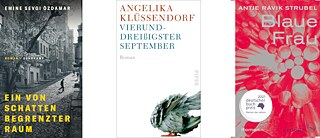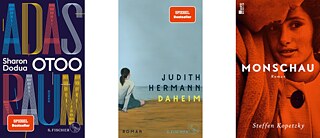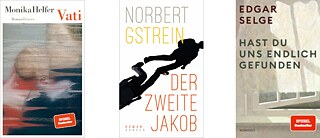And it has to be said that this row itself did not come as much of a surprise. Throughout 2021 you could confidently rely within the world of books on encountering debates and attitudes centring yet again on the phenomenon known by the woolly and worn-out phrase ‘identity politics’. It would be a considerable advance if future discussions on (German-language) literature were to replace this facile concept with a more precise analysis of the situation. If we define ‘identity politics’ within literature as the attempt to take hold of one’s own origins, history and family and to understand the structures that underlie them, then the great majority of novels rated highly by the critics in 2021 may be said to stem from their authors’ preoccupation with identity politics. The question that then necessarily arises with any particular novel is this: does it carry conviction in aesthetic terms?
Monika Helfer, Norbert Gstrein and Edgar Selge are three authors who last year all published books that in their very different and very distinctive ways tackled the themes of origin and family. The Austrian writer Monika Helfer followed up her highly successful novel Die Bagage (‘The dregs’) with Vati (‘Dad’) - a slender book, but a powerful one, in which she attempts to find out about the big unknown in her life: her father, who returned war-wounded from the Second World War, gave his children away to sundry relatives following the death of their mother, and then simply disappeared. In his book Der zweite Jakob (‘The second Jacob’) on the other hand, Norbert Gstrein - an Austrian writer living in Hamburg - displays his unmistakable brand of elegance in his interweaving of an unsettling plot-line about a series of murders of women, and the story of the crisis experienced by an actor just before his sixtieth birthday - a man who lives in fear of having inherited the psychopathic attributes of his uncle, and ends up back in the Tyrolean village of his childhood. Then we have another actor: Edgar Selge, born 1948, pulled off an astounding success with his debut novel Hast du uns endlich gefunden (‘Have you found us at last’). He recounts the story of growing up as the son of a prison governor in a family home characterised by devotion to the arts - a devotion, however, that did not save him from beatings by his father and humiliations at the hands of both his parents. What we have here is a Bildungsroman spawned by the heavily burdened spirit of Germany’s Wirtschaftswunder years.

The way that art can become not merely someone’s essential purpose in life but their actual place of habitation is demonstrated by Emine Sevgi Özdamar in her long-awaited novel Ein von Schatten begrenzter Raum (‘A space defined by shadows’), her first for seventeen years, and published to coincide with her 75th birthday. It looks back on a life divided between Istanbul, Paris and Berlin (East and West), and serves as a requiem to an era of libertinage driven out of existence by the emergence of ideology and violence.
Two of last year’s most highly praised novels shine a light on issues relating to the East/West divide. In Vierunddreissigster September (‘The 24th of September’) Angelika Klüssendorf offers a platform equally to the living and the dead of a village in Brandenburg. By dint of this neat idea she is able to incorporate a variety of comic touches, but she is also out to remind her readers - especially those in western Germany - that turns of phrase such as ‘der abgehängte Osten’ (‘the abandoned East’) are grossly pejorative and do not remotely do justice to the life experiences of the individuals involved. Antje Rávik Strubel, for her part, was awarded the coveted German Book Prize for her novel Blaue Frau (‘Blue woman’) in which she deploys both poetic language and narrative finesse in combining her experience of rape with a broader view of the complex relationship between East and West in Europe. In her acceptance speech she thematised the ‘war’, as she termed it, currently being fought ‘around the question of what designators and descriptors we should use, and hence also around the question of who we are permitted to be, and who makes the relevant decisions’.

Judith Hermann and Sharon Dodua Otoo both came out with books showing a clear determination to fight for the cause of women. Adas Raum (‘Ada’s realm’) by London-born but Berlin-based Otoo tells the stories of a number of different women caught up in a variety of power relationships right across the centuries - and it is a book that divided the critics with its even-handed approach to the highly diverse experiences of disadvantage that it spells out one after the other. By contrast, Daheim (‘Home’), Judith Hermann’s second novel, met with an almost exclusively enthusiastic response with its elegiac mood that harks back quite deliberately to her 1998 collection of stories Sommerhaus, später (‘The Summer House, Later’). Like the characters in the earlier stories the protagonist of Daheim is now older, and she has withdrawn to an isolated house on the North Sea coast in order to escape the traps that would otherwise beset her in her life.
2021 was the second year of Covid 19, and an epidemic is accordingly the fitting subject of Monschau (‘Monschau’) by Steffen Kopetzky, one of Germany’s currently most entertaining top-flight writers. In 1962 a smallpox outbreak ripped through the town of Monschau in the Eifel region of Germany. An engineer at the local steelworks had brought the disease back from India. It was a real-life event rather than an imaginary one, and Kopetzky displays great bravura in the way he constructs a gripping plot around the bare facts and at the same time exposes society’s helpless response to a highly infectious disease, so starkly reminiscent of what happened in 2020. Steffen Kopetzky is thus yet another writer in whom the realities of the present are reflected in their depiction of the past.
Christoph Schröder, born 1973, is a freelance critic who writes for a variety of media outlets including Deutschlandfunk, ‘Süddeusche Zeitung’ and ‘Die Zeit’.
Translated by John Reddick
Books referred to:
Norbert Gstrein: Der zweite Jakob (‘The second Jacob’), Hanser Verlag.
Monika Helfer: Vati (‘Dad’), Hanser Verlag.
Judith Hermann: Daheim (‘Home’), S. Fischer Verlag.
Angelika Klüssendorf: Vierunddreissigster September (‘The 24th of September’), Piper Verlag.
Steffen Kopetzky: Monschau (‘Monschau’), Rowohlt Berlin Verlag.
Sharon Dodua Otoo: Adas Raum (‘Ada’s realm’), S. Fischer Verlag.
Emine Sevgi Özdamar: Ein von Schatten begrenzter Raum (‘A space defined by shadows’), Suhrkamp Verlag.
Antje Rávik Strubel: Blaue Frau (‘Blue woman’), S. Fischer Verlag.
Edgar Selge: Hast du uns endlich gefunden (‘Have you found us at last’), Rowohlt Verlag.
Copyright: © Litrix.de

